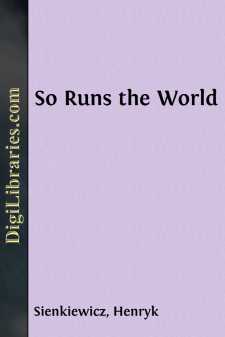Categories
- Antiques & Collectibles 13
- Architecture 36
- Art 48
- Bibles 22
- Biography & Autobiography 813
- Body, Mind & Spirit 142
- Business & Economics 28
- Children's Books 14
- Children's Fiction 11
- Computers 4
- Cooking 94
- Crafts & Hobbies 4
- Drama 346
- Education 46
- Family & Relationships 57
- Fiction 11829
- Games 19
- Gardening 17
- Health & Fitness 34
- History 1377
- House & Home 1
- Humor 147
- Juvenile Fiction 1873
- Juvenile Nonfiction 202
- Language Arts & Disciplines 88
- Law 16
- Literary Collections 686
- Literary Criticism 179
- Mathematics 13
- Medical 41
- Music 40
- Nature 179
- Non-Classifiable 1768
- Performing Arts 7
- Periodicals 1453
- Philosophy 64
- Photography 2
- Poetry 896
- Political Science 203
- Psychology 42
- Reference 154
- Religion 513
- Science 126
- Self-Help 84
- Social Science 81
- Sports & Recreation 34
- Study Aids 3
- Technology & Engineering 59
- Transportation 23
- Travel 463
- True Crime 29
So Runs the World
Description:
Excerpt
PART SECOND
SO RUNS THE WORLD
ZOLA.
I have a great respect for every accomplished work. Every time I put on the end of any of my works finis, I feel satisfied; not because the work is done, not on account of future success, but on account of an accomplished deed.
Every book is a deed—bad or good, but at any rate accomplished—and a series of them, written with a special aim, is an accomplished purpose of life; it is a feast during which the workers have the right to receive a wreath, and to sing: "We bring the crop, the crop!"
Evidently the merit depends on the result of the work. The profession of the writer has its thorns about which the reader does not dream. A farmer, bringing the crop to his barn, has this absolute surety, that he brings wheat, rye, barley, or oats which will be useful to the people. An author, writing even with the best of faith, may have moments of doubt, whether instead of bread he did not give poison, whether his work is not a great mistake or a great misdeed, whether it has brought profit to humanity, or whether, were it not better for the people and himself, had he not written anything, nothing accomplished.
Such doubts are foes to human peace, but at the same time they are a filter, which does not pass any dirt. It is bad when there are too many of them, it is bad when too few; in the first case the ability for deeds disappears, in the second, the conscience. Hence the eternal, as humanity, need of exterior regulator.
But the French writers always had more originality and independence than others, and that regulator, which elsewhere was religion, long since ceased to exist for them. There were some exceptions, however. Balzac used to affirm that his aim was to serve religion and monarchy. But even the works of those who confessed such principles were not in harmony with themselves. One can say that it pleased the authors to understand their activity in that way, but the reading masses could understand it and often understood it as a negation of religious and ethical principles.
In the last epoch, however, such misunderstanding became impossible, because the authors began to write, either in the name of their personal convictions, directly opposite to social principles and ties, or with objective analysis, which, in its action of life, marks the good and the evil as manifestations equally necessary and equally justified. France—and through France the rest of Europe—was overflowed with a deluge of books, written with such lightheartedness, so absolute and with such daring, not counting on any responsibility toward people, that even those who received them without any scruples began to be overcome with astonishment. It seemed that every author forced himself to go further than they expected him to. In that way they succeeded in being called daring thinkers and original artists. The boldness in touching certain subjects, and the way of interpreting them, seemed to be the best quality of the writer. To that was joined bad faith, or unconscious deceiving of himself and others....



